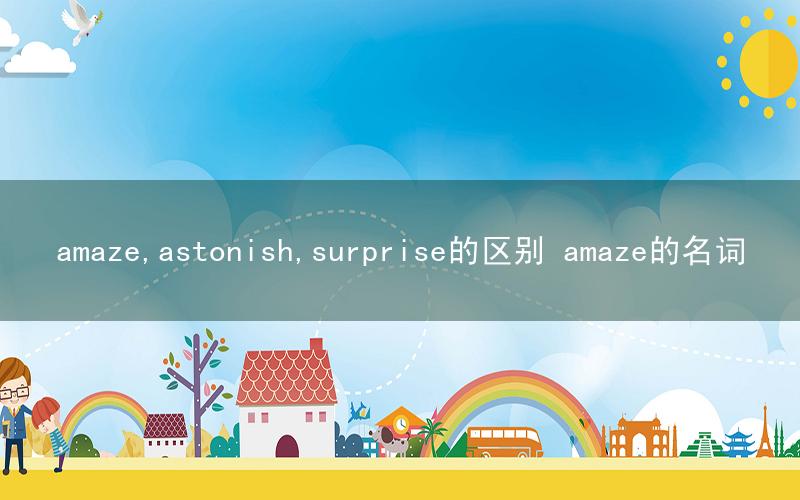在英语里面,有很多词的意思是相近的,就像汉语里面,有很多同义字一样。amaze,astonish,surprise都是标识“惊讶”的意思,但是,在使用方面,也是有所区别的。

一、amaze,astonish,surprise的区别
这三个单词都表示“惊讶”的意思,但它们在语气、程度和用法上有所不同。
1、Amaze:语气比较弱,表示“惊奇、惊异”,通常用于形容令人感到惊奇的事情或情况,但不一定是非常出乎意料的。
例句:
The beauty of the sunset never fails to amaze me.
日落的美丽总是让我惊叹。
2)I was amazed by the size of the elephant.
大象的体型让我惊讶。
2、Astonish:语气比amaze强,表示“惊讶、震惊”,通常用于形容非常出乎意料、令人惊讶的事情或情况。
例句:
1)The news of her sudden resignation astonished everyone in the company.
她突然辞职的消息让公司里的每个人都感到惊讶。
2)The magician's tricks never fail to astonish the audience.
魔术师的魔法总是让观众惊讶不已。
3、Surprise:语气比amaze和astonish都要弱,表示“惊喜、意外”,通常用于形容令人感到惊喜、意外的事情或情况。
例句:
1)The surprise party was a huge success and she was completely taken aback.
惊喜派对非常成功,她完全被吓了一跳。
2)I was surprised to see him at the airport, as I thought he was still in Europe.
看到他在机场,我很惊讶,因为我以为他还在欧洲。
3)The sudden rain shower caught us by surprise and we got completely soaked.
突然的雨淋湿了我们,我们完全没有料到。
4)The news of their engagement was a pleasant surprise for everyone.
他们订婚的消息让每个人都感到惊喜。
5)The surprise ending of the movie left the audience in awe.
电影的意外结局让观众惊叹不已。
总的来说,amaze、astonish和surprise都表示惊奇、惊讶的意思,但语气、程度和用法上有所不同,需要根据具体情况选择使用。
二、amaze的名词形式
amaze是一个动词,表示“使惊奇、使惊异”的意思,它的名词形式是amazement,表示“惊奇、惊异”的意思。例句:
1)The audience watched in amazement as the magician made the rabbit disappear.
观众惊奇地看着魔术师让兔子消失了。
2)To my amazement, I found my lost wallet in the park.
令我惊奇的是,我在公园里找到了丢失的钱包。
注意,amazement是一个不可数名词,不能用于表示“一件惊奇的事情”之类的复数形式。
本站部份资料来自网络或由网友提供,如有问题请速与我们联系,我们将立即处理!
版权所有©四级英语单词 网站地图 陇ICP备2023000160号-4
免责声明:本站非营利性站点,以方便网友为主,仅供学习。